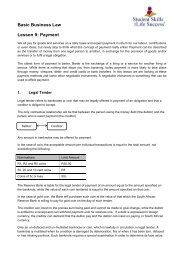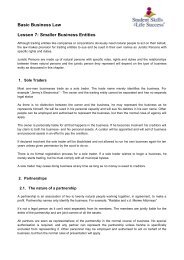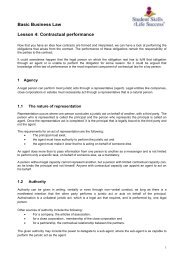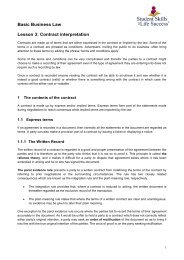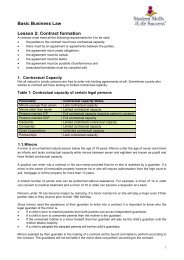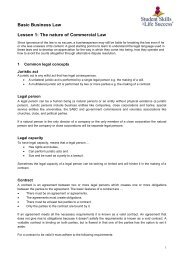Basic Business Law. Lesson 8. Companies
This is the eighth lesson of the "Student Skills for Life Success" "Basic Business Law" course. The topics covered in this booklet are: 1. The nature of a company 2. The Companies Act 3. The Companies and Intellectual Property Commission 4. Types of companies 5. Forming a company 6. Trading as a private company 7. Shareholder meetings 8. Duties and rights of directors 9. Private companies in financial distress
This is the eighth lesson of the "Student Skills for Life Success" "Basic Business Law" course. The topics covered in this booklet are:
1. The nature of a company
2. The Companies Act
3. The Companies and Intellectual Property Commission
4. Types of companies
5. Forming a company
6. Trading as a private company
7. Shareholder meetings
8. Duties and rights of directors
9. Private companies in financial distress
You also want an ePaper? Increase the reach of your titles
YUMPU automatically turns print PDFs into web optimized ePapers that Google loves.
Other features of the Act are the following:<br />
• Shareholders have extensive rights to obtain information from the<br />
company.<br />
• A higher degree of accountability is demanded from directors.<br />
• Transparency is improved through stakeholder participation rules.<br />
• High standards of corporate governance are encouraged.<br />
• Minimum accounting standards is set for annual reports.<br />
• There are stricter provisions governing directors’ conduct and liability.<br />
• <strong>Companies</strong> are classified as either profit or non-profit companies.<br />
• Take-overs and fundamental transactions are strictly regulated.<br />
• <strong>Companies</strong> are allowed to merge into one new entity, provided that both companies are in a<br />
financially sound position in that they have more assets than liabilities and can pay their debts<br />
as the fall due.<br />
• Provision is made for a modern business rescue regime.<br />
• There is a move towards the decriminalisation of company law and the establishment of bodies<br />
for the effective enforcement of the legislation.<br />
• Minority shareholders and other stakeholders, such as employees, have better protection,<br />
powers, and remedies under the Act, including the ability to bring class actions.<br />
• Provision is made for new insolvency laws.<br />
• An act of a company is not void anymore solely because the company did not have the capacity<br />
to do the act, or the directors did not have the authority to perform the act on behalf of the<br />
company.<br />
• <strong>Companies</strong> are specifically prohibited from reckless, negligent, or fraudulent trading and<br />
persons who were knowingly a party to such conduct are guilty of an offence.<br />
3. The <strong>Companies</strong> and Intellectual Property Commission<br />
The <strong>Companies</strong> and Intellectual Property Commission (CIPC) was established in terms of section 185 of the<br />
<strong>Companies</strong> Act when the Office of <strong>Companies</strong> and Intellectual Property Enforcement (OCIPE) and the<br />
<strong>Companies</strong> and Intellectual Property Registration Office (CIPRO) amalgamated in 2010.<br />
The CIPC receives its directives from the Minister of Trade and Industry. It’s a juristic person that functions<br />
as an organ of state within the public administration but outside the public service.<br />
The main functions of the Commission are to …<br />
• register companies, co-operatives and intellectual property rights,<br />
• disclose information on its register,<br />
• promote awareness of, company and intellectual property law,<br />
• promote compliance with the relevant legislation,<br />
• ensure the efficient and effective enforcement of the legislation,<br />
• monitor compliance with and contraventions of financial reporting standards, and make<br />
recommendations in this regard and<br />
• report to, conduct research for, and advise the Minister of Trade and Industry, on matters of<br />
national policy relating to company and intellectual property law.










